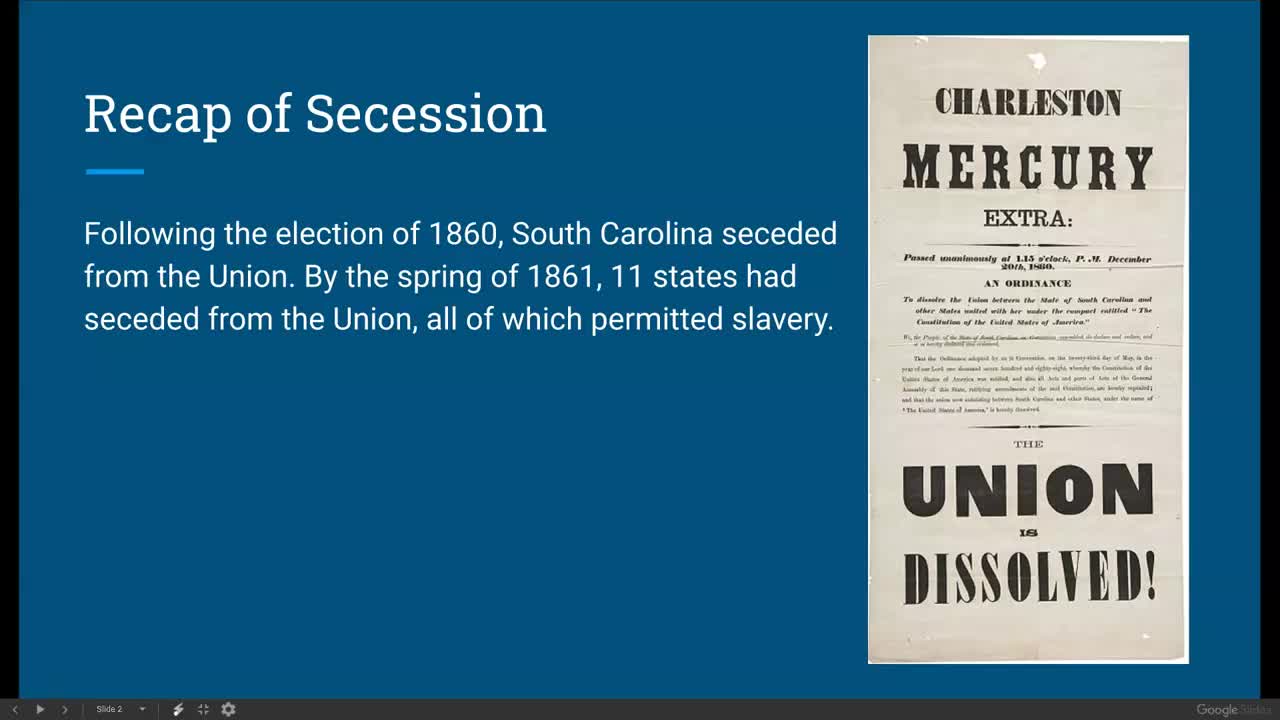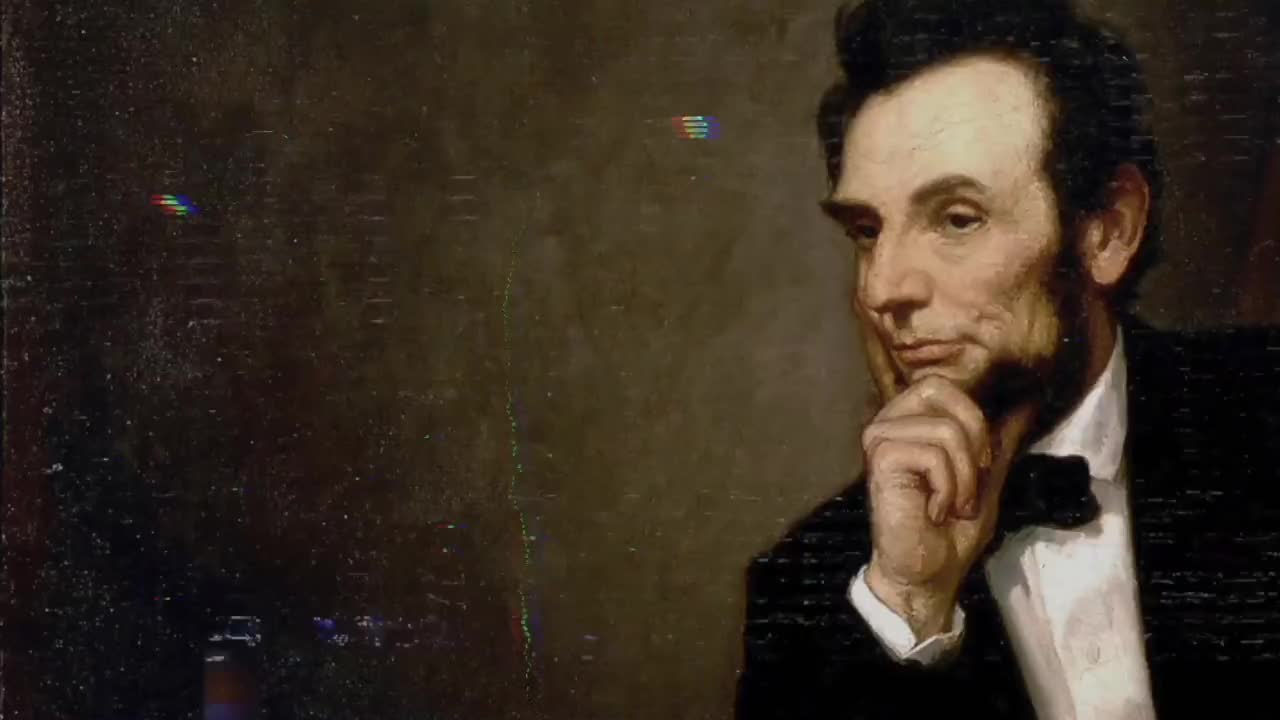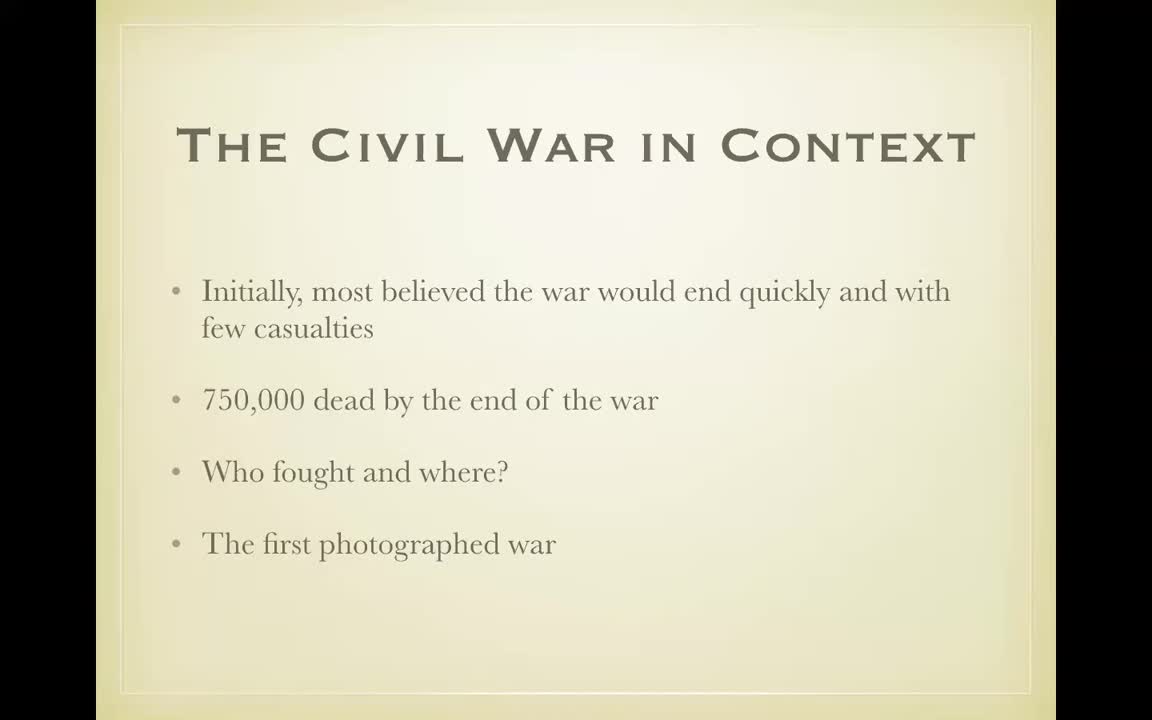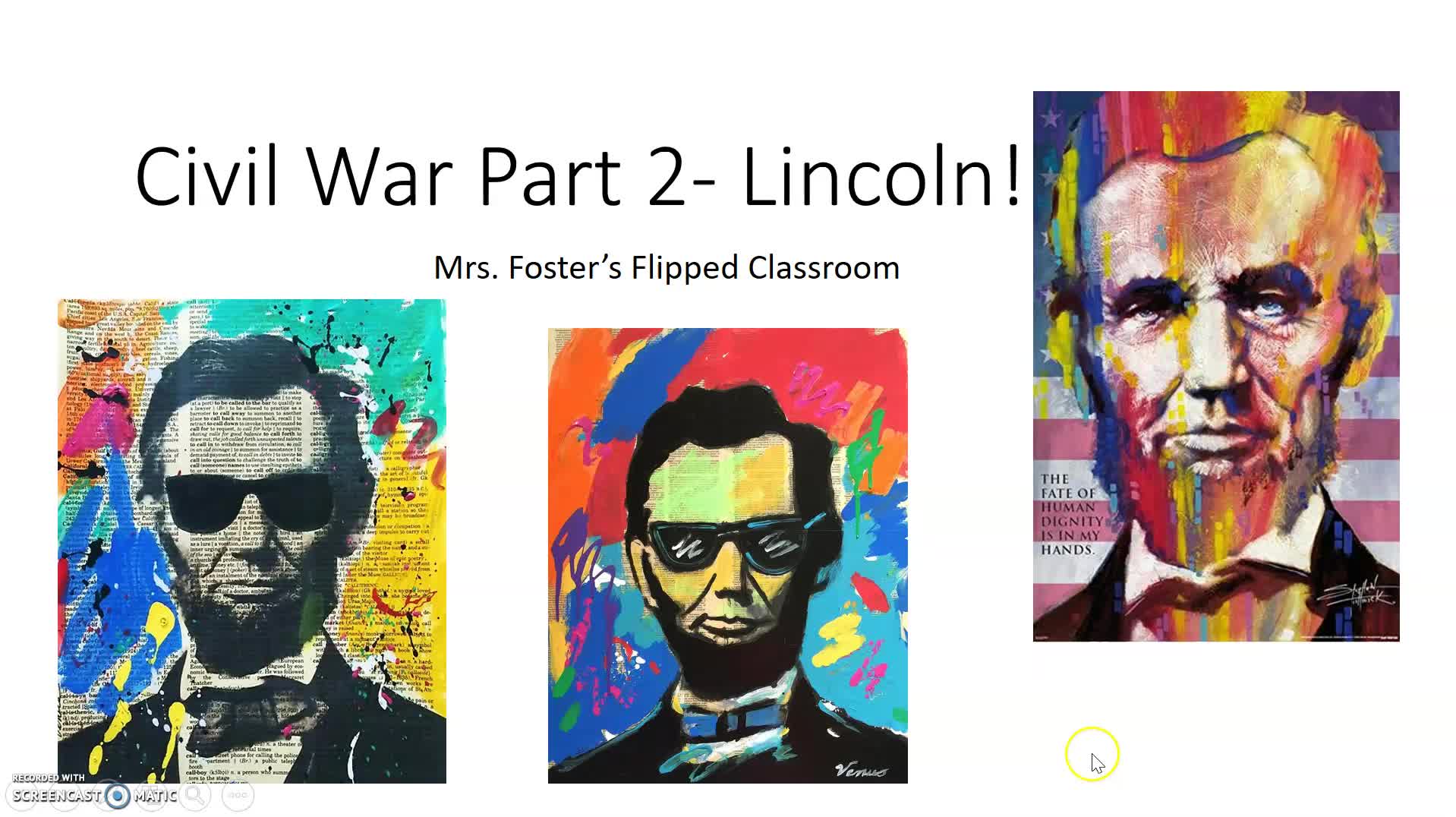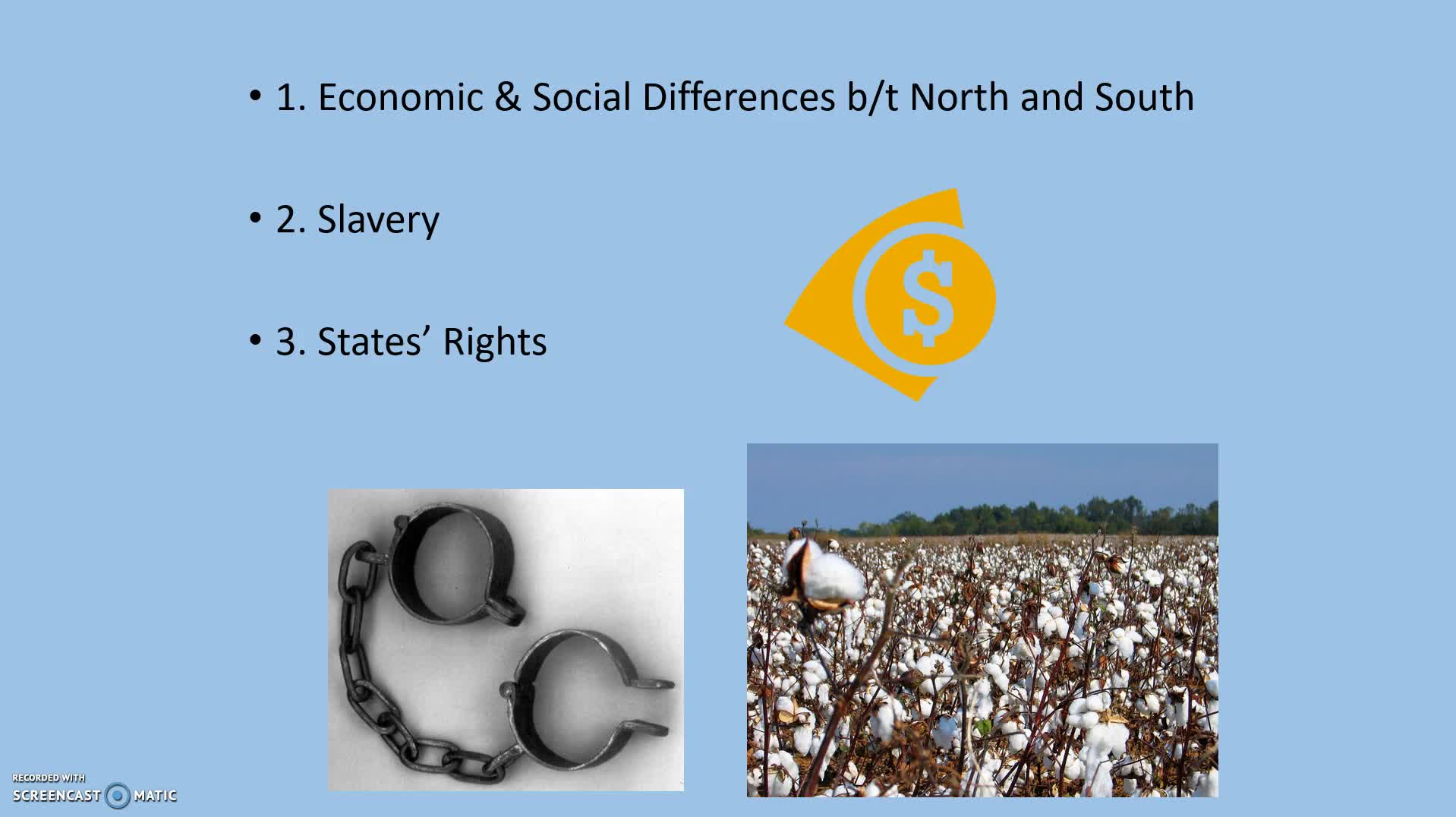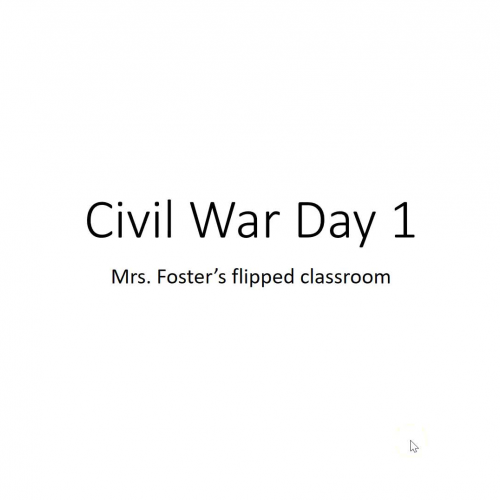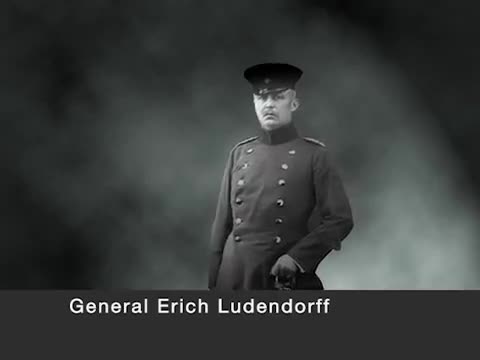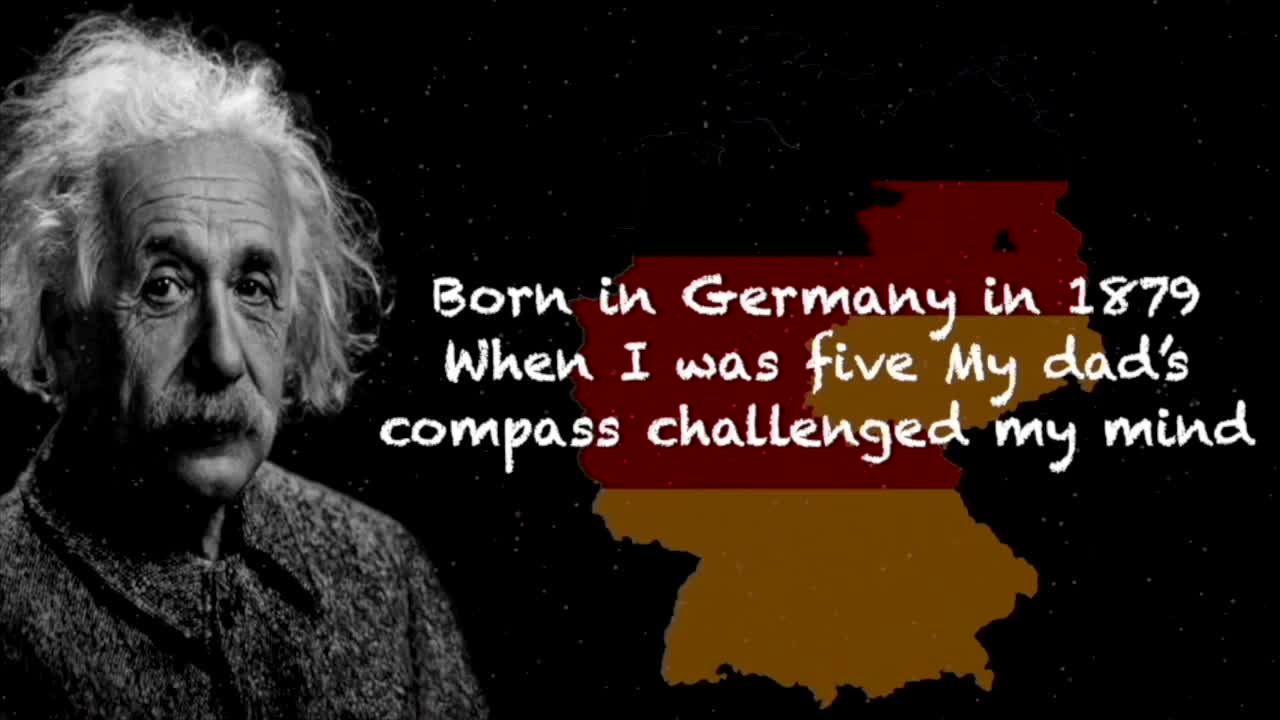The American Civil War - An Overview
High School / History / Civil War
Class welcome. You've made it. You've made it to the final week of our course. Of course, we're going to talk about the Civil War. So before this, you know, you've gotten into the 1850s. You understand the role of abolitionists. You understand the sectionalism and the divide that's in the country. And we've reached the precipice here, right? Abraham Lincoln is going to be elected president, and that is going to cause South Carolina to secede, so let's get into it, okay? The Civil War. This is just a brief overview. So following the election of 1860, South Carolina seceded from the union. By the spring of 1861, 11 states had seceded from the union all of which permitted slavery. Okay? What happens is Lincoln is elected in November. And then about a month later, December, I think, 20th. The state of South Carolina issues a secession and an order of secession or an ordinance of secession. You should remember South Carolina was the same state that was at the center of the nullification crisis that we talked about weeks back. So they are leaving the union and then that's going to cause a domino effect of other states to do the same. So how does the war begin? Lincoln's elected Lincoln's president, South Carolina secedes. 5 days after that secession, federal troops withdrew from Charleston, South Carolina, headed for fort Sumner, a federal fort in Charleston harbor. Okay? So at issue here is the presence of federal troops. And the fact that there is a federal fort in an area of, you know, next to the state that has said, we're not a part of the United States anymore. Under the command of general beauregard, the confederates opened fire on fort Sumter. Resulting in the secession of four more slave states and officially starting the war. Okay, so the war has begun and other states are going to see the conflict with the federal government and decide, you know, our way of life, our states our economy is in danger from this federal expansion to government that opposes slavery, right? Let's talk about the differences between the north and the south. Because there are major differences, right? In the north, there's 23 states and 21 million people. In the south, there's 11 states in 9 million people and much of those 9 million people are slaves. The north is also going to have an advantage when it comes to manufacturing. The north is going to control the seas with its navy. And it's going to have twice the density of railroads, per square mile as the south, and you can understand that that's going to be a problem too. I mean, you can't ship things to and from, you know, you've got resources, manufacturing resources that you're trying to get from one place to the next. So the north has its advantage to be sure. Let's talk about some of the strengths of the southern confederacy. Well trained officers who had fought in the Mexican-American War. So obviously they had fought for the federal government in the past. And they're very familiar with the southern landscape and territory. Now that's kind of something that should make you think way back, right? With the Revolutionary War, one of the advantages was that the colonists knew the region. They knew the geography. So let's talk about some of the most significant battles, the battle of antietam. Okay? This is the bloodiest single day in American history. Because there's 22,000 casualties. And that is more than all the casualties of the Revolutionary War. General Robert E. Lee commander of the confederate army of Northern Virginia lost half of his army, Lee had hoped a victory would encourage Great Britain to recognize the confederacy as an independent nation. It did not. The battle of Gettysburg. This is important because this is a battle that occurred in Pennsylvania. General Robert E. Lee went on the offensive and decided to invade Pennsylvania, it was a three day battle with a 170,000 soldiers, 40,000 of which were casualties. I remember the casualties means you might have died, but it also means you were injured. So it's not necessarily a death, but there were to be sure a lot of deaths. On the third day, Lee ordered an assault against the union on cemetery ridge. Confederate soldiers fired on the union, general George Pickett led a charge along open field that left many confederates dead. This is known as Pickett's charge. Lee's army lost about one third of its men, and this was the high water mark of Lee's offensives. This is going to result in the decline and then at this point the confederate confederacy is really losing the war. Okay, so a year later, Abraham Lincoln is going to commemorate the battle of Gettysburg. There's going to be a ceremony that's held and Lincoln is going to give his famous two minute speech it's one of the greatest speeches ever written, where he makes a reference to the Declaration of Independence and the fact that all men are created equal. So let me show you a couple of excerpts from the speech. Four score and 7 years ago our fathers brought forth on this continent, a new nation conceived in liberty and dedicated to the proposition that all men are created equal. That we here highly resolve that these dead shall not have died in vain, that this nation under God shall have a new birth of freedom and that government of the people by the people for the people shall not perish from the earth. And if you look closely at this picture, you can kind of see Lincoln is sort of in the center might see him. He's not wearing a hat, he's to the left of the man that is wearing that top hat. Towards the back, you could definitely look at him. You could even look online. There's pictures of it that circle where Lincoln is. And I want to also point out that later on in the lesson, you will hear a reenactment, audio reenactment of the speech, and I'll also provide you a link to this to the text itself. So you should definitely read it. It took him two minutes to say it. It'll take you about the same to read it. Another important event. Turning point. Is when this war that had started and continued on the basis of trying to get the states that is seceded. The confederacy to come back into the country to join the union again. So it's really about preserving the union. Preserving the country. This is going to change, though, in late 1862. It changes for a couple of reasons, right? You have abolitionists like Frederick Douglass and others who are pressuring Lincoln to end it. And slavery. And Lincoln himself had his own views. He did oppose slavery, so he wanted to end it. But he was a very centered, president he knew that you can't rock the boat too far left or too far right. You know, this way or that way. And in doing so, he was able to kind of steer the country in the direction slowly of abolishing slavery. He is going to issue a preliminary Emancipation proclamation, which says, look, join the union. Rejoin the union to the southern states. And he gives them a deadline. And when they don't reach that deadline, when they don't meet that deadline of rejoining the union, he is going to declare with the Emancipation proclamation in, I believe, January of 1863, that the slaves in those rebellious states are free. All right, so again, as I said, the Emancipation proclamation gave a deadline to the confederacy to rejoin the union in emancipate their slaves and they would even be compensated. They would even be given money. Had they chosen to do so. But zero of the Confederate States took up the offer or met the deadline of January 1st. They shall be then thenceforward and forever free. Now the irony here is that no one was really set free, because the states were in rebellion, so they're not going to abide by this order. But it is symbolic, and it lays the groundwork. For what comes later on, the war is now changed. It's not just a war about reestablishing the union with southern states. It's a war about abolishing slavery, which has existed in the United States now for hundreds of years. African American males would now be allowed to fight for the union. This is also important. Of course, there's going to be discrimination, African American males will not be paid very well. There's a video in the lesson that shows a movie called glory, which is about the 54th regiment, which was the first black regiment in the war, you know, they're used mainly to build forts and do a lot of labor. And of course they're not paid appropriately. They're not paid equally, which was, of course, unfair, but it at least was a start to have them involved in the war, and that is, that was a great thing. And as I said, the Emancipation only applies to rebellious states. Lincoln didn't want to rock the boat and antagonize the slave states that had remained with the union. So you got to remember states like Maryland were border states where slavery was allowed, but they didn't secede. They weren't in rebellion. Okay? So they stayed in the union despite Lincoln being elected. So in order to not also lose those states, the Emancipation proclamation, this first step only applied to the rebellious states. And I love this picture of the African American who's reading the newspaper, the following day, or in the evening, after the Emancipation proclamation is issued. I just love the smile. It's brilliant picture. Brilliant painting. Okay, let's get back to some of the battles. The road to appomattox, general Lee's army had been decimated to only 35,000 troops. His troops retreated west, after general grant commander of the Union Army ordered an attack on Petersburg, Lee's army was starving. He asked that food be sent to the Amelia courthouse, okay? So this is, as I said, Gettysburg was a turning point, this is 1865 now, the war is coming to a close. So at appomattox courthouse, here's a picture of the trail towards it. Rations never arrived in a 125,000 union soldiers surrounded Lee's small army. Under John Gordon, the confederate army pushed back on the union cavalry near the village of appomattox courthouse, only to discover 50,000 union infantry ahead and plenty of other infantry closing in from behind. Lee surrenders. Lisa rendered a general grant later that day in the home of Wilmer McLean. Grant sent three days worth of food to the starving confederates. And that is pretty much the end of the war. The war comes to a close. It's also important to note that the Thirteenth Amendment will be passed at this time in 1865, the Thirteenth Amendment abolished slavery, but it will not be ratified until after Lincoln's assassination.
